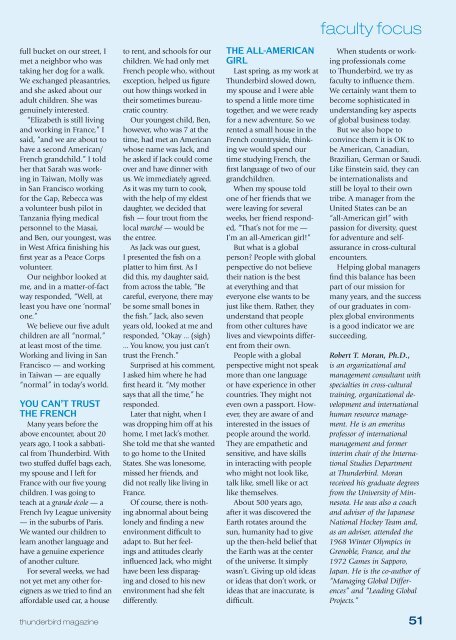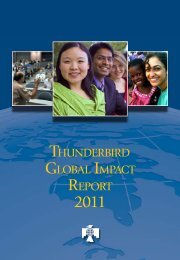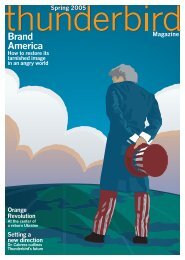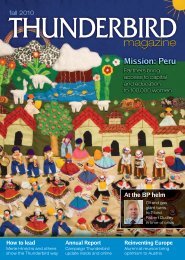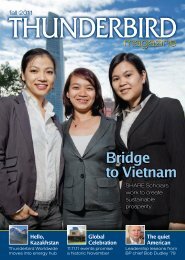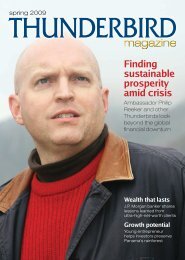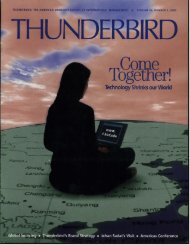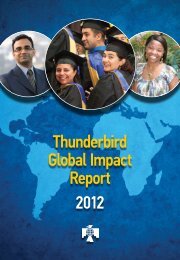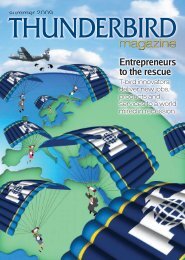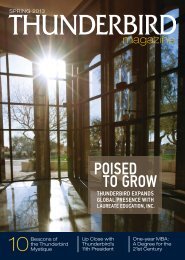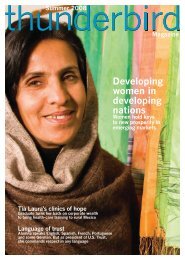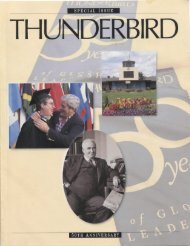Spring 11 MASTER.indd - Thunderbird Magazine
Spring 11 MASTER.indd - Thunderbird Magazine
Spring 11 MASTER.indd - Thunderbird Magazine
You also want an ePaper? Increase the reach of your titles
YUMPU automatically turns print PDFs into web optimized ePapers that Google loves.
faculty focus<br />
full bucket on our street, I<br />
met a neighbor who was<br />
taking her dog for a walk.<br />
We exchanged pleasantries,<br />
and she asked about our<br />
adult children. She was<br />
genuinely interested.<br />
“Elizabeth is still living<br />
and working in France,” I<br />
said, “and we are about to<br />
have a second American/<br />
French grandchild.” I told<br />
her that Sarah was working<br />
in Taiwan, Molly was<br />
in San Francisco working<br />
for the Gap, Rebecca was<br />
a volunteer bush pilot in<br />
Tanzania flying medical<br />
personnel to the Masai,<br />
and Ben, our youngest, was<br />
in West Africa finishing his<br />
first year as a Peace Corps<br />
volunteer.<br />
Our neighbor looked at<br />
me, and in a matter-of-fact<br />
way responded, “Well, at<br />
least you have one ‘normal’<br />
one.”<br />
We believe our five adult<br />
children are all “normal,”<br />
at least most of the time.<br />
Working and living in San<br />
Francisco — and working<br />
in Taiwan — are equally<br />
“normal” in today’s world.<br />
YOU CAN’T TRUST<br />
THE FRENCH<br />
Many years before the<br />
above encounter, about 20<br />
years ago, I took a sabbatical<br />
from <strong>Thunderbird</strong>. With<br />
two stuffed duffel bags each,<br />
my spouse and I left for<br />
France with our five young<br />
children. I was going to<br />
teach at a grande école — a<br />
French Ivy League university<br />
— in the suburbs of Paris.<br />
We wanted our children to<br />
learn another language and<br />
have a genuine experience<br />
of another culture.<br />
For several weeks, we had<br />
not yet met any other foreigners<br />
as we tried to find an<br />
affordable used car, a house<br />
to rent, and schools for our<br />
children. We had only met<br />
French people who, without<br />
exception, helped us figure<br />
out how things worked in<br />
their sometimes bureaucratic<br />
country.<br />
Our youngest child, Ben,<br />
however, who was 7 at the<br />
time, had met an American<br />
whose name was Jack, and<br />
he asked if Jack could come<br />
over and have dinner with<br />
us. We immediately agreed.<br />
As it was my turn to cook,<br />
with the help of my eldest<br />
daughter, we decided that<br />
fish — four trout from the<br />
local marché — would be<br />
the entree.<br />
As Jack was our guest,<br />
I presented the fish on a<br />
platter to him first. As I<br />
did this, my daughter said,<br />
from across the table, “Be<br />
careful, everyone, there may<br />
be some small bones in<br />
the fish.” Jack, also seven<br />
years old, looked at me and<br />
responded, “Okay ... (sigh)<br />
... You know, you just can’t<br />
trust the French.”<br />
Surprised at his comment,<br />
I asked him where he had<br />
first heard it. “My mother<br />
says that all the time,” he<br />
responded.<br />
Later that night, when I<br />
was dropping him off at his<br />
home, I met Jack’s mother.<br />
She told me that she wanted<br />
to go home to the United<br />
States. She was lonesome,<br />
missed her friends, and<br />
did not really like living in<br />
France.<br />
Of course, there is nothing<br />
abnormal about being<br />
lonely and finding a new<br />
environment difficult to<br />
adapt to. But her feelings<br />
and attitudes clearly<br />
influenced Jack, who might<br />
have been less disparaging<br />
and closed to his new<br />
environment had she felt<br />
differently.<br />
THE ALL-AMERICAN<br />
GIRL<br />
Last spring, as my work at<br />
<strong>Thunderbird</strong> slowed down,<br />
my spouse and I were able<br />
to spend a little more time<br />
together, and we were ready<br />
for a new adventure. So we<br />
rented a small house in the<br />
French countryside, thinking<br />
we would spend our<br />
time studying French, the<br />
first language of two of our<br />
grandchildren.<br />
When my spouse told<br />
one of her friends that we<br />
were leaving for several<br />
weeks, her friend responded,<br />
“That’s not for me —<br />
I’m an all-American girl!”<br />
But what is a global<br />
person? People with global<br />
perspective do not believe<br />
their nation is the best<br />
at everything and that<br />
everyone else wants to be<br />
just like them. Rather, they<br />
understand that people<br />
from other cultures have<br />
lives and viewpoints different<br />
from their own.<br />
People with a global<br />
perspective might not speak<br />
more than one language<br />
or have experience in other<br />
countries. They might not<br />
even own a passport. However,<br />
they are aware of and<br />
interested in the issues of<br />
people around the world.<br />
They are empathetic and<br />
sensitive, and have skills<br />
in interacting with people<br />
who might not look like,<br />
talk like, smell like or act<br />
like themselves.<br />
About 500 years ago,<br />
after it was discovered the<br />
Earth rotates around the<br />
sun, humanity had to give<br />
up the then-held belief that<br />
the Earth was at the center<br />
of the universe. It simply<br />
wasn’t. Giving up old ideas<br />
or ideas that don’t work, or<br />
ideas that are inaccurate, is<br />
difficult.<br />
When students or working<br />
professionals come<br />
to <strong>Thunderbird</strong>, we try as<br />
faculty to influence them.<br />
We certainly want them to<br />
become sophisticated in<br />
understanding key aspects<br />
of global business today.<br />
But we also hope to<br />
convince them it is OK to<br />
be American, Canadian,<br />
Brazilian, German or Saudi.<br />
Like Einstein said, they can<br />
be internationalists and<br />
still be loyal to their own<br />
tribe. A manager from the<br />
United States can be an<br />
“all-American girl” with<br />
passion for diversity, quest<br />
for adventure and selfassurance<br />
in cross-cultural<br />
encounters.<br />
Helping global managers<br />
find this balance has been<br />
part of our mission for<br />
many years, and the success<br />
of our graduates in complex<br />
global environments<br />
is a good indicator we are<br />
succeeding.<br />
Robert T. Moran, Ph.D.,<br />
is an organizational and<br />
management consultant with<br />
specialties in cross-cultural<br />
training, organizational development<br />
and international<br />
human resource management.<br />
He is an emeritus<br />
professor of international<br />
management and former<br />
interim chair of the International<br />
Studies Department<br />
at <strong>Thunderbird</strong>. Moran<br />
received his graduate degrees<br />
from the University of Minnesota.<br />
He was also a coach<br />
and adviser of the Japanese<br />
National Hockey Team and,<br />
as an adviser, attended the<br />
1968 Winter Olympics in<br />
Grenoble, France, and the<br />
1972 Games in Sapporo,<br />
Japan. He is the co-author of<br />
“Managing Global Differences”<br />
and “Leading Global<br />
Projects.”<br />
thunderbird magazine 51


